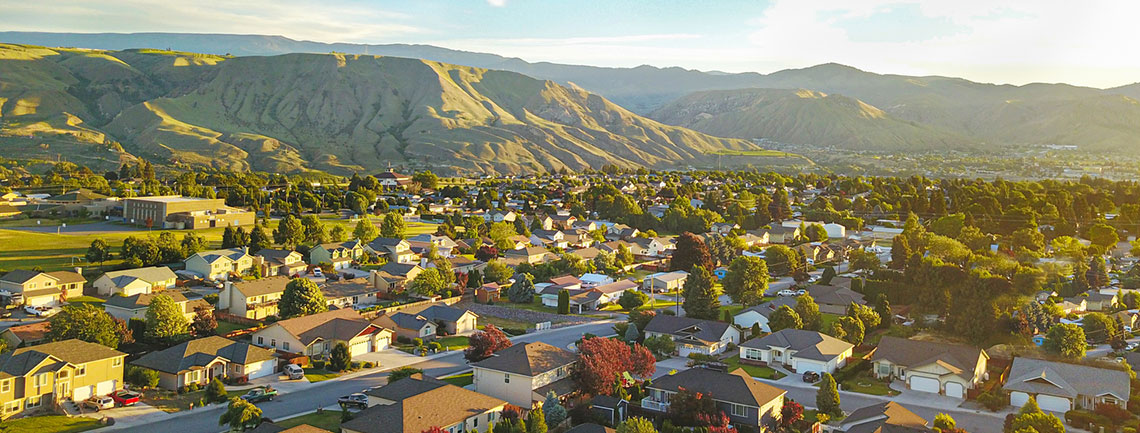
Lush rainforests, stunning mountain peaks and a thriving economy with ample jobs are just a few of the many reasons to live in Washington State.
The real estate market reflects this desirability as the average home for sale in Washington state was $562,900 as of November 2023. This price is well above the national average of $412,000 from September 2023. Since homes are so much more expensive, you may wonder if buying a home in Washington State is worth it in 2024.
We may be a little biased, but we think the prices don’t tell the whole story. The Evergreen State is a fantastic place to live, and there are several homeownership programs that make buying a home in Washington an attainable goal.
In this article, we’ll go over why you would want to live in Washington, what you can expect the wages/cost of living to be and how purchasing real estate (either a first or a second home) fits into the picture.
Location
Bordered by Idaho, Oregon, Canada and the Pacific Ocean, Washington is the most northwestern contiguous U.S. State. It’s also the second-most populous state on the West Coast (trailing only California). The Evergreen State is home to Mt. Rainier, a 14,000-foot active volcano, the Cascade Mountains, the mighty Columbia River and over 3,000 miles of coastline.
While most people think of Washington as constantly rainy, this isn’t true of the eastern half of the state. Since it sits in the shadow of the Cascade Mountains, Eastern Washington is a semi-arid basin, receiving only 15-30 inches of rain a year.
Economic conditions
U.S. News ranked Washington’s economy as #13 in the nation as of 2023. As a state, Washington has a highly educated population and relatively low unemployment. The major industries that drive the state’s economy are aerospace engineering, military/defense and agriculture (particularly in the eastern half of the state). It’s the fifth-largest state economy in the U.S. by GDP.
Employment
Unemployment in Washington is currently at 4% statewide. Washington saw a decrease of 2,600 jobs in November 2023. Top job categories include local government, health services, part manufacturing and construction.
Wages
Washington has a much higher minimum wage than the federal limit ($7.25) at $16.28 per hour. The Evergreen State also has the fourth-highest wages in the nation — an average of $81,245 in 2021 versus the U.S. average of $67,698.
Cost of living
Although Washington state boasts high wages, it also has a high cost of living — 16% more expensive than other U.S. states. However, this average masks the differences between individual markets in Washington state. Seattle, for instance, is a whopping 49% more expensive than the nation as a whole, whereas Moses Lake is 4% less expensive. Popular urban and suburban areas like Seattle and Bellingham are much pricier than other regions in Washington.
Real estate market conditions
The real estate market in Washington was red hot for a while, but things are starting to cool off from their post-pandemic highs. In November 2023, 25.2% of homes in Washington sold above list price, and the number of houses that dropped in price was down by 8.5% YOY.
Home prices
Home prices across the state vary widely, ranging from $849,925 in Seattle to $342,500 in outlying areas like Yakima. This data is not broken out by homes sold with an agent and homes sold without an agent in Washington state, but bear in mind that homes sold with an agent tend to command a 26% higher price than homes sold without a Realtor.
All told, you can expect homes for sale in Washington state to be more expensive than the national average. However, wages tend to be much higher here, so that’s an important factor to keep in mind.
Mortgage rates
According to Bankrate.com, the average mortgage rates for a 30-year, fixed-rate mortgage in Washington state as of January 12, 2024 is 7.04%. and 6.37% for a 15-year fixed mortgage. This is pretty close to the national average of 7.02% from January 12, 2024. These rates assume the home is your primary residence (i.e., you’re not living in Idaho and buying a second home in Washington state).
Inventory
While the housing market has cooled down a bit since the Fed hiked mortgage interest rates, the demand for homes in Washington remains high and inventory remains low. The current supply of homes to meet demand is two months, and homes are selling relatively quickly, averaging 26 days on the market.
Facts & Data
Fact 1: Borrowers who are eligible for a VA-guaranteed home loan can qualify for 100% financing, which means they don’t have to make a down payment at all.
The down payment is often the biggest hurdle for new homebuyers. If you’re a veteran (or spouse of a veteran), using a VA home loan will potentially clear this hurdle for you, making getting into a house in Washington state much easier than it would be otherwise.
Fact 2: Thanks to government loan assistance programs, you usually don’t need a full 20% down payment.
While 20% down used to be the standard down payment for a mortgage, this isn’t often the case anymore. Depending on the type of loan, your down payment might range from 3% to 20% of the purchase price. The full 20% is usually required in special situations, such as a second home in Washington state, very poor credit, or a conventional mortgage for an investment property.
Fact 3: The FHA home loan program requires a minimum down payment of 3.5%.
This program is extremely popular among first-time homebuyers due to its low down payment option, favorable interest rate, and flexible terms.
Conclusion
Washington is a beautiful, well-paying state to live in, but the real estate comes with a high price tag. If you’re lucky enough to be selling your home in Washington state, you’re primed to take advantage of the seller’s market filled with eager buyers and high prices.
If you’re looking to buy a home in Washington state, you may feel a little more intimidated. However, rest assured that there are the economic factors to back up the high prices (low unemployment and high wages), and there are many government-backed mortgage programs to help buyers get into a home in Washington with minimal down payment requirements.
What's your Solarity story?
We're on a mission to tell the stories of our members and how they are living their best lives. Do you have a Solarity story to share?



